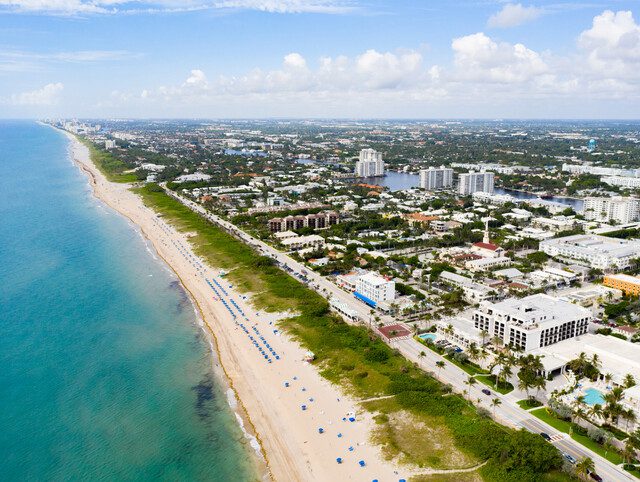With the abundance of senior living options available, it can be difficult to know which lifestyle is best suited to your needs and preferences. To help, we’ve compiled this list of common retirement options in Delray Beach, Florida, and offered suggestions on factors to consider when making your decision.
Types of Senior Living – Understanding Your Choices
Whether you’re already enjoying the perks of retirement or just getting started in the retirement planning process, one of the most important aspects to keep in mind is how you’ll navigate any potential health changes. For some, this may mean budgeting for home safety upgrades and in-home care, while others may need supported living options like assisted living and continuing care retirement communities.
Your desired lifestyle is another significant factor in the decision process. Do you crave stunning oceanfront views? Do you envision yourself joining fitness classes or taking up new hobbies? Will you want to stay in a familiar setting? Are you hoping to remove the burden of home maintenance? From proximity to family and easily accessible amenities to opportunities for socialization, wellness programs, and luxury styles, you’ll want to make sure your home is up to par with your needs.
Retirement Options for Seniors
Aging in Place with Hired Care
If your plan is to age in place at home, you’ll need to make sure you have plans in place should you or your spouse need assistance with transportation, home or yard maintenance tasks, or should you require advanced medical care.F
Talk through your plans and preferences with loved ones and look into the costs associated with things like home safety upgrades or in-home health aides. Minor safety updates to your home might cost a few hundred dollars, while serious updates or a renovation can cost hundreds of thousands.
The Federal Government reports that 7 out of 10 older adults will require long-term care at some point in their lives. Data from Genworth puts the median monthly cost for home health aides in the United States around $6,292. Having conversations about your future now can help ensure you are equipped to enjoy the retirement you desire.
Moving in with Adult Children
Some older adults (and their children!) find a multigenerational housing situation to be the ideal setup in retirement. Research from Generations United shows the positive impact this living arrangement can have on the whole family, including the opportunity to form closer bonds, improve mental and physical health, and improve the financial situation of one or more family members.
After first ensuring the whole family is on board with this decision, other major factors — and potential expenses — to consider are the space you’ll be living in and the care you might require. Do you feel you will have the amount of privacy you desire? Are there any safety upgrades that need to be made to make the space comfortable for you? Will you require the support of outside caregivers? These costs are similar to those you might incur if you choose to stay in your own home and can range from a few hundred to a few hundred thousand dollars.
Specialized Care Communities
Specialized care communities are excellent options to consider if you or your loved one require additional medical assistance. For those who are still rather independent but could use help with activities of daily living like grooming or dressing, assisted living communities typically offer private rooms with on-site support from healthcare providers. The average monthly cost for assisted living can start around a few thousand dollars but go up depending on location, services, amenities, and exclusivity.
For individuals with Alzheimer’s or other forms of dementia, there are residential communities that specialize in memory care. These communities often feature specialized memory-focused programming and have professionals on hand who specialize in working with adults with memory loss. Due to the specialized nature of memory care, the monthly cost for this type of care is approximately $1,600 more than the average monthly cost of assisted living.
Independent Living for Seniors
If you’re ready to ditch the trappings of homeownership for a maintenance-free, active lifestyle, independent living communities are a wonderful option. Senior apartments, frequently located in a dedicated senior rental community, often have safe design elements — like grab bars and wide doorways — built in and reserved for older adults. Monthly rental fees for senior apartments can vary greatly depending on the apartment size, location, and available amenities, like a fitness center or laundry service.
Another independent living option is a 55+ community. These planned communities reserved for older adults consist of a neighborhood of homes typically built around a central attraction, like a clubhouse, and might even cater to particular interests or hobbies. Because “55 and over” can be a catchall term, inquire about age requirements at any independent living communities you consider.
The cost of living in a 55 and over community typically includes the purchase of your home within the community and any accompanying fees like an HOA fee or monthly membership dues. According to a report from the National Investment Center for Seniors Housing and Care (NIC), the average monthly cost of independent living can range from a few hundred to well over $9,000.
Life Care Communities
If you’re looking for the best of an independent living community paired with the security of knowing your future care is planned for, consider a Life Care community. Life Care communities are a type of continuing care retirement communities (CCRCs) that offer luxury retirement living in tandem with convenient access to higher levels of care, often directly on-site. Most CCRCs require an entrance fee and are reserved for seniors 62+. Entrance fees vary widely by community.
In addition to an entrance fee, CCRCs have a monthly fee that is, on average, a few thousand dollars. This fee covers the cost of things like dining, transportation, maintenance, and activities. Fees are determined based on the number of occupants and the floor plan chosen.
CCRC Contract Types
The type of CCRC contract a community offers can impact the cost of the entrance fee and monthly fee. The three primary contract types are Type A (Life Care), Type B (Modified), and Type C (Fee-for-Service). Type A contracts, which are the only contract type available at Harbour’s Edge, are the most comprehensive, often building the cost of future care into the entrance and monthly fees, with the tradeoff being little to no increase in monthly expenses should you require higher levels of care.
A Type C contract might be less expensive upfront or have lower monthly fees for independent living, but it will include the market rate of any additional care services you need, should you ever require them. Type B contracts sit in the middle of the spectrum, often building a portion of advanced care costs into the entrance or monthly fees through a discounted market rate or a set number of “free” days per year.
Find Luxury Senior Living in Florida at Harbour’s Edge
Harbour’s Edge in Delray Beach, Florida, is a premier continuing care retirement community offering active older adults ages 62 and older unmatched views of the Intracoastal Waterway, delicious dining experiences, and a rich social life, not to mention the peace of mind that comes from living in a Life Care community.
A Life Care contract at Harbour’s Edge offers access as needed to on-site skilled nursing and rehabilitation services as well as individualized support in your independent living residence through our Lifespace Personal Services. If you or a loved one would like to learn more about the opportunities that await at Harbour’s Edge, please connect with our team.


